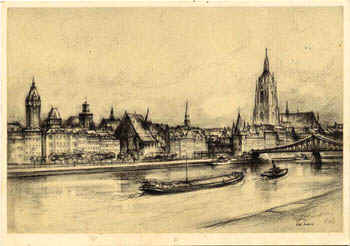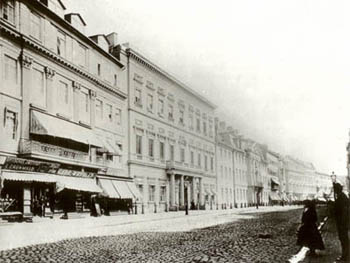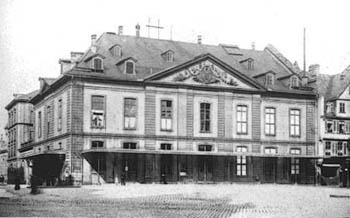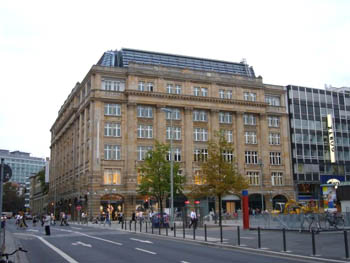
![]()
Introduction
1842-1843
1853
Illustrations
This page is also available in French
![]()
Berlioz visited Frankfurt on two occasions at an interval of ten years. In the autumn of 1842 he intended to use the city as the starting point of his long-planned tour of Germany, but was disappointed. Perhaps because of a lack of enthusiasm on the part of Karl Guhr (1787-1848), the Kapellmeister (musical director) of the Frankfurt theatre, it proved impossible to give a concert there, and Berlioz was discouraged from returning there for the foreseeable future. Ten years later Berlioz had become more widely known in Germany, and after the death of Guhr there was a change of management in Frankfurt. Berlioz was now welcome, and in August 1853 he was invited to give two concerts which proved highly successful.
Berlioz gave an account of his visit to Frankfurt in 1842-1843 in the first of a series of open letters about his first trip to Germany which he published on his return in the Journal des Débats (13 August 1843 for the letter concerning Frankfurt). These were reproduced by Berlioz first in 1844 in his Voyage musical en Allemagne et en Italie, then later in his posthumous Memoirs with a few modifications. The composer’s correspondence supplements the account of the visit of 1842-1843, and is the major source of information for the later visit of 1853. Numerous excerpts from these texts will be cited below.
![]()
(1842)
19 September: Berlioz dines in Paris with Meyerbeer who writes to Frankfurt to prepare the way
20 September-mid October: Berlioz in Brussels (concerts on 26 September and 9 October)
17 October: Berlioz in Frankfurt
23 October: Berlioz back in Paris
12 December: Berlioz leaves Paris for Brussels
19-24 December: Berlioz in Frankfurt
(1843)
ca. 14 January: Berlioz leaves Mannheim for Frankfurt
17 January: Berlioz leaves Frankfurt for Weimar without Marie Recio, who catches up with him in Weimar
Mid-May: stop in Frankfurt on the way from Hanover to Darmstadt
![]()
Berlioz started his first extended trip to Germany in December 1842; this was preceded in the autumn by an exploratory visit to Brussels where he gave two concerts, after which he made his way to Frankfurt. He was expecting to perform there as well, though in the event was disappointed. On 23 October, back in Paris, Berlioz wrote to his sister Nancy about this excursion (Correspondance Générale no. 784; hereafter CG for short):
[…] I am back from Frankfurt after giving two successful and lucrative concerts in Brussels. My arrival in Germany was supposed to have been announced by two letters of Meyerbeer which went astray; as a result I fell from heaven in Frankfurt where nothing had been prepared for my concerts. The director of the theatre [Karl Guhr] was anxious to make handsome amends for this setback by organising on a grand scale two splendid evenings which will include the large-scale movements of my Requiem together with my first two symphonies. To give him a month for his preparations I therefore left him all my music. […] In Frankfurt as soon as they knew my name I received the most attentive and I would even say the most respectful welcome. I also found there several old friends from Paris. The journey on the Rhine is actually a wonderful experience; all these old castles, ruins and dark mountains plunged me into a waking dream caressed with memories of the poems of Goethe and the tales of Hoffmann. It is one of the most beautiful travel impressions I have experienced. […] I shall therefore return to Germany and go on from there to Prussia in a few weeks; I shall write to you before this second departure. […]
Two letters of Berlioz to Guhr relate to this first visit. On 18 October, while in Frankfurt, Berlioz writes to entrust to Guhr a large bundle of music, stressing that the scores of the Fantastic Symphony and Harold in Italy existed only in unique copies – both works were as yet unpublished (CG no. 781). On the 23rd, now back in Paris, he sends him the score and parts of the Requiem with instructions for the projected performances, and adds (CG no. 782):
[…] I await your news with impatience; you know the immense significance for me of this musical début in Germany, and I am very grateful to you for the interest you are showing. As for practical money matters, they are no less critical for me; I hope you will be able to guarantee me the sum you mentioned. I entrust all my interests of whatever kind to your friendly care as a fellow-artist. […]
On 29 October Berlioz wrote to his friend Ferdinand Hiller, who was in Frankfurt at the time and whom he may well have seen earlier that month, asking him to visit Guhr and find out whether preparations were proceeding as agreed – Berlioz was worried that he had not received any news as yet (CG no. 785). By late November he was still expecting the projected concerts in Frankfurt to take place (CG no. 789, to his other sister Adèle). On the eve of his departure for Germany he wrote as promised to Nancy and in his outline of the tour announced the dates of the concerts in Frankfurt as being 25 December and 1 January (CG no. 791, 9 December).
But everything went wrong from the start, as the Memoirs relate:
[…] I had left Paris in the firm belief that I would be giving three concerts right at the start: the first was to be in Brussels, where I had been invited by the Société de la Grande Harmonie; the other two were already announced in Frankfurt by the director of the theatre, who seemed to attach great importance to them and to be eager to make them a success. And yet what was the outcome of all these fine promises and display of zeal? Absolutely nothing! […]
Disappointed in Brussels, Berlioz moved on to Frankfurt, where he was on 19 December (CG no. 791quinquies [in vol. VIII]); his first impressions were positive:
[…] What a charming and alert city! It exudes everywhere an air of activity and wealth; furthermore it is well built, white and shining like a newly-minted coin, surrounded with the fragrant greenery of streets planted with trees and flowers in the style of English gardens. […]
But very soon after his arrival he was informed by Guhr that the projected concerts were impossible for the time being: two young violin prodigies from Italy, the Milanollo sisters, were on tour, the public had no ears for anyone else, and letters of Guhr to Berlioz in Brussels to warn him must have gone astray… The concerts had to be postponed, though they were not cancelled altogether: Berlioz continued to believe for some time that they would eventually take place, as appears from letters of 24 December (CG no. 792 [in vol. VIII]) and 10 January (CG no. 799). In the latter he tells his correspondent that he had met Guhr in Mannheim the day before, and Guhr promised him he would have 24 violins at his disposal when he came to Frankfurt. But Berlioz’s suspicions had already been aroused. On 30 December he wrote to Ferdinand Friedland, in Frankfurt at the time, asking him to request Guhr to return without delay some of the music Berlioz had left (CG no. 794; cf. nos. 781-2, 791quinquies [in vol. VIII]). He added that he would write later to Guhr or to his friend Ferdinand Hiller to ask for the rest of the music ‘if there is really nothing to be done in this blessed city of Frankfurt’. Eventually, on 29 January, now in Weimar, Berlioz wrote to Guhr asking for the return of the ‘monstrous piles’ of music that were still in Guhr’s hands: he was giving up the idea of concerts in Frankfurt until his return, ‘since matters are turning out very nicely for me in Berlin, Leipzig, and Dresden’ (CG no. 806bis [in vol. VIII]).
One compensation of Berlioz’s stays in Frankfurt in 1842 and early in 1843 – he stayed at the Russischer Hof Hotel – was to see again his friend Ferdinand Hiller. Hiller later wrote an account of this period in which he suggested that Guhr was insincere and did not wish to let Berlioz perform in Frankfurt. This is an accusation that Berlioz himself never made outright; instead he chose to present Guhr in the Débats article of 1843 and later in the Memoirs in a semi-humorous light though without hostility, as a serious musician who had an endearing habit of swearing in French. Berlioz even inserted in his account a letter he supposedly wrote to Guhr in August 1843, after the publication of his Musical Journey to Germany in the Journal des Débats, in which he thanked him for not taking offence at his portrayal by Berlioz.
Another compensation was to hear in Frankfurt a performance of Fidelio under the direction of Guhr at the theatre. As well as introducing him to a small but capable theatre orchestra of the kind he was to meet frequently in Germany, Berlioz also heard there for the first time the great baritone Pischek who impressed him so greatly and whom he was to hear again some years later in Vienna.
From Frankfurt Berlioz moved on at the turn of the year to Stuttgart, Hechingen, and Mannheim, after which he returned briefly to Frankfurt around the middle of January. It was there that, according to the account later given by Hiller, Berlioz tried on 17 January to give the slip to Marie Recio, though without success – she caught up with him in Weimar. Here is translation (by Michel Austin) of the relevant passage in Hiller’s memoirs (Künstlerleben, pp. 90-1):
Towards the end of 1841 [in fact 1842] Berlioz began his first concert tour of Germany. Shortly before I had come back from Italy to my native city of Frankfurt; we met in the theatre, where Fidelio was being performed, and greeted each other as old friends. The conductor Guhr had thought it a good idea not to keep any evening free for Berlioz. Berlioz travelled to Stuttgart, Mannheim, Karlsruhe, and then on the way back to Frankfurt. By chance I had organised a concert for the following day and asked Berlioz to come to it. “Impossible” was his answer. “You know that I am accompanied by a singer. She sings like a cat - that may not matter, but the problem is that she insists on taking part in all my concerts. From here I am going to Weimar, where we have an ambassador, and so it is out of the question that I should go there with her. But I have laid my plans. She believes that this evening I am invited by the Rothschilds; so I leave the hotel at 7, my seat in the stagecoach is reserved, my baggage is there, I depart, and a few hours later she receives from the head-waiter a letter with all she needs for the return journey”. After these kind of preparations I could not insist on my invitation. The following day I was fully occupied with the concert, but on the third day I was curious to find out how events had turned out. I went to the Russischer Hof hotel, where the porter readily told me the sequel to the story. On receiving the letter Miss Recio was furious, and the following morning she went to the Post Office, where she had no difficulty finding out the truth. At that time travellers were not only counted, but their names were also taken down in writing, and Berlioz seemed so little worried of seeing his plan come to nothing that he had taken no further precautions. His faithful companion thus caught up with him. I must have written to him some light-hearted letter on the subject, as a few days later I received a letter from Miss Recio in which she roundly told me off and explained to me what a gulf there was between egotism and love. And in the middle of the letter were, alas, two lines from my friend which alluded to my words and said: “We were neither caught nor caught up with, but certain of having been reunited”.
Note. Hiller preserved Marie Recio’s letter, written from Weimar; the full text of the original is reproduced in NL p. 231 no. 804bis. The sentence written by Berlioz which Hiller paraphrases actually says in the original French: “l’on a été ni rattrapé, ni attrapé, car on attendait avec [la?] certitude de ne pas se tromper.” The end of the sentence as written by Berlioz is ambiguous, perhaps deliberately so, since “se tromper” could be read as meaning either “to be mistaken” or “to deceive each other”. Hiller’s paraphrase, “sicher gewesen, sich wieder zu vereinigen”, avoids the ambiguity.
![]()
Berlioz stopped once more in Frankfurt around mid-May – for the fourth time – on his way from Hanover to Darmstadt, but by this time all hopes of a concert there had been abandoned.
Berlioz met Guhr subsequently on at least two occasions. In August 1845 Guhr was present at the Beethoven festival in Bonn, though the account in the Soirées de l’orchestre only mentions his name in a list of the numerous delegates who attended (Berlioz stopped in Frankfurt on the way back from the festival). In May 1846 Guhr was apparently in Paris and was invited by Berlioz to tea at home with others (CG no. 1038). Berlioz writes to his correspondent, Émile Deschamps, ‘You will find there the director of the theatre in Frankfurt, the celebrated Kapellmeister Guhr and a tenor from his company’. The reference to the ‘celebrated Kapellmeister’ is probably ironical: it was above all to Berlioz’s presentation in the Musical Journey to Germany (which was later incorporated in the Memoirs) that Guhr owed his fame.
![]()
The years 1852 and 1853 marked the resumption of Berlioz’s active contacts with Germany after a five-year interruption. In November 1852 Berlioz attended a performance in Weimar of Benvenuto Cellini under Liszt and gave a concert there; more visits were to follow in subsequent years. In 1853 Berlioz made the first of many visits to Baden-Baden and appeared again as conductor in cities where he had been previously welcomed (Brunswick, Hanover, Leipzig, later Dresden), as well as visiting some for the first time (Bremen, later Gotha). The invitation he received in July 1853 from Frankfurt will have come as a welcome surprise. Gustav Schmidt (1816-1882), appointed Kapellmeister there in 1851, was, unlike Guhr, genuinely devoted to Berlioz and his music, and may indeed have been anxious to put right the misunderstandings of the past. With the agreement and support of the director of the theatre Johann Hoffmann (1802-1865), also recently appointed (1852), Schmidt approached Berlioz, who quickly responded with detailed suggestions about the programme, possible dates and practical arrangements (CG no. 1618, 15 July, from Paris). In another letter in early August, this time from Baden-Baden (CG no. 1621), Berlioz made further suggestions: in addition to the first two parts of The Damnation of Faust which had been agreed, the programme would also include Harold in Italy (the solo viola was eventually played by Berlioz’s friend Ernst, who had performed the work previously) and the Repos de la Sainte Famille, a piece which required ‘a good tenor capable of singing very softly’ (CG no. 1621). The success of this piece in Berlioz’s concerts in Germany in 1853 (Brunswick, Hanover, Leipzig), following its success in London earlier that year, was to encourage him to add to the original group of three pieces composed in 1850 and develop the work over the next year into what became l’Enfance du Christ, the first part of which he dedicated to his nieces Joséphine and Nancy (cf. CG no. 1830).
Berlioz arrived in Frankfurt around 14 August, and rehearsals started promptly. Two concerts were given on 20 and 24 August at the Frankfurt theatre (CG nos.1618, 1621, 1622, 1627, 1648; the theatre is no longer extant), with the same programme which also included Berlioz’s orchestration of Weber’s Invitation to the Dance. Months later Berlioz wrote of the success of this visit to his friend Humbert Ferrand (CG no. 1648 [cf. vol. VIII)], 13 November):
[…] There was not there the immense crowd of Baden-Baden; but I was fêted in a way that is most unusual in the free cities, that is the cities that are the slaves of mercantile ideas, of business, as is the case with Frankfurt. […]
Before going to Frankfurt Berlioz had written to Liszt about the projected visit and was warned by him of the need to placate local music critics (cf. CG no. 1620, late July). Shortly after his return to Paris in late August Berlioz sent to Liszt a detailed account of his successes in Baden-Baden and Frankfurt (CG no. 1624, 3 September):
[…] The concert in Baden-Baden was a great success, the playing very satisfactory, though the public was too large for the hall. From there I went to Frankfurt to repeat part of the programme; the audience was more sparse but much more enthusiastic. The Frankfurt papers treated me very well and I was repaid for all the calls you advised me to make... Schmidt has been admirable, dedicated and helpful. I will send him the score of Tristia; they are thinking of staging the work for the performances of Shakespeare’s Hamlet in accordance with the instructions I gave them.
Let me tell you that our two acts of Faust have been performed three times without cuts and that the fugue on amen has won me every heart. A good half of the audience in Baden-Baden and Frankfurt took it seriously as once did the audience with the sonnet in Molière’s Misanthrope. One of my players in Frankfurt said to me recently with a knowing look: « Is this a joke?… I fear it might be… » In truth the fugue is not sufficiently offensive, it has an organ-like sonority and a euphonious harmony which spoil everything. So when Mephistopheles says to the drunkards:
By heaven, Gentlemen, your
fugue is really fine!
there must be conventional minds who agree with me but find me lacking in modesty, and notice that I am paying compliments to myself in public. The joke is all the better for it. […]
Writing to his sister Adèle a few days later he adds further details (CG no. 1627, 7 September):
[…] My travels to Germany were limited to Baden-Baden and Frankfurt. I organised and conducted the festival in Baden-Baden to which M. Bénazet had invited me, and then I went to give two concerts at the Frankfurt theatre, all of this with stupendous success. In Frankfurt I was the guest at an immense supper, with crowns, poems, speeches, toasts, etc. The Prussian military band came to perform my overture Les Francs-Juges under my hotel windows. In short they did me proud. […]
[…] The first two acts of Faust had a terrific impact, and likewise in Frankfurt. This has straightened out many silly ideas that the amateur and professional musicians of these two cities, which I had not yet visited, had formed about my music. […]
[…] In October I may accept the invitation from the manager of the Munich theatre to go and put on Faust in Bavaria; but I am not sure. […]
On the same day as he wrote to Liszt, Berlioz sent a warm letter of thanks to Gustav Schmidt and his colleagues in Frankfurt, in which he announced the sending of two recently published works, the Soirées de l’orchestre and the as yet unperformed Tristia (CG no. 1626):
[…] I will be sending you without delay the score of my Tristia for Hamlet, and as soon as you tell me that the translation is done and that the theatre intends to work on the staging of this little work, I will send you in writing all the necessary instructions. […]
I would be really delighted if the Frankfurt theatre could carry out our Shakespearean project during the month of October; this might induce me to go to Munich and stop in Frankfurt to hear Hamlet under your direction. […]
In the event the projected performance of Tristia did not take place, and the work remained unperformed in Berlioz’s lifetime.
As for Munich, it had been an intended destination from the start of Berlioz’s travels in Germany (CG nos. 791, 794-5, 823ter [in vol. VIII], 1001). While in Frankfurt in 1853 he wrote to Franz Dingelstedt in Munich to raise the possibility of a visit there (CG no. 1622, 16 August):
[…] Allow me to ask you whether before I go back to Paris it would be opportune for me to make a trip to Munich. This is the only capital city in Germany which I have not yet visited, and the high standing it enjoys in the artistic world makes me very keen to introduce you to some of my most recent compositions. Among these is my legend The Damnation of Faust which I have just performed at the Festival in Baden-Baden and which at the moment is under rehearsal at the Frankfurt theatre. […]
During the autumn Berlioz continued to hope the visit might take place (CG nos. 1629, 1631, 1637). The following year he actively planned to go to Munich in the summer, but was unexpectedly forced to cancel the trip: a seat at the Institute had just become vacant and Berlioz had to stay in Paris to canvas for it – though in the end without success (CG nos. 1749, 1751bis [vol. VIII], 1756, 1761, 1764, 1768, 1771, 1773-4, 1775bis [vol. VIII], 1776-7, 1779, 1783, 1784, 1785, 1799).
Although Berlioz did not return to Frankfurt, he maintained links with musicians there (cf. CG nos. 2041, 2203), and the visits to Germany of 1852-4 were for him a significant landmark. As he writes in October 1854 in chapter 59 of his Memoirs:
[…] I am certain to be able to have this work [l’Enfance du Christ] performed easily and frequently in Germany, where I am invited back by several important cities. I now go there frequently, I have made four trips over the last eighteen months. The welcome I receive gets warmer all the time; the musicians show for me an understanding that grows by the day. Those from Leipzig, Dresden, Hanover, Brunswick, Weimar, Karlsruhe, and Frankfurt have lavished on me marks of friendship for which I cannot find adequate words of thanks. […]
![]()

This 1920 postcard is in our collection. The drawing is by R. Enders.![]()

The Russischer Hof Hotel where Berlioz stayed in 1842-3 was built in 1794 and demolished in 1891. The photograph, taken by Carl Friedrich Mylius in 1875, is now in the public domain. The hotel is no longer extant.![]()

This photo is in the public domain. We are most grateful to our
friend Pepijn van Doesburg for sending us a copy.![]()

We are most grateful to Pepijn van Doesburg for his photograph
of this building.![]()
![]()
The page Berlioz in Frankfurt was created on 1 October 2006, and revised on 17 April 2016. Revised and enlarged on 1 March 2024.
© (unless otherwise stated) Michel Austin and Monir Tayeb